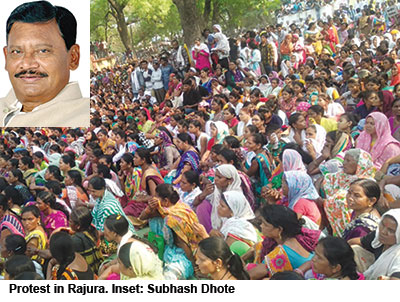 Reportedly continuous sexual abuse of minor girls at a private tribal students’ hostel run by a former Congress MLA has rocked Maharashtra. Even as citizens geared up to vote for 48 members of Parliament who will represent the state in the Lok Sabha, Delhi, widespread rallies have been staged by women’s groups and tribal organisations in the Vidharbha region protesting the failure of the police to promptly register a first information report (FIR) and demanding the arrest of former MLA Subhash Dhote, promoter of the residential Infant Jesus English Public High School, Rajura, in Chandrapur district.
Reportedly continuous sexual abuse of minor girls at a private tribal students’ hostel run by a former Congress MLA has rocked Maharashtra. Even as citizens geared up to vote for 48 members of Parliament who will represent the state in the Lok Sabha, Delhi, widespread rallies have been staged by women’s groups and tribal organisations in the Vidharbha region protesting the failure of the police to promptly register a first information report (FIR) and demanding the arrest of former MLA Subhash Dhote, promoter of the residential Infant Jesus English Public High School, Rajura, in Chandrapur district.
Admitting a petition filed by the survivors’ mothers on April 22, the Nagpur bench of the Bombay high court constituted a committee to investigate the parents’ allegations and ordered the state government to deposit Rs.50,000 in the petitioners’ bank accounts on behalf of the victims. The Infant Jesus English Public High School, Rajura (estb.1977) is a class I-XII English-medium residential school with 130 tribal girls and 135 boys on its muster rolls.
According to the FIR, 13 minor girls of the school fell unconscious and had to be admitted to local hospitals where they were diagnosed as being heavily sedated and sexually molested. Subsequently, police investigations revealed that the school administration had blatantly violated government norms by housing boys and girls in one hostel building, and appointing a male superintendent for the girls hostel who had freely permitted men to visit the hostel at night. The police also recovered “incriminating and objectionable items” (sedatives etc) from the office of the superintendent.
Ironically, the Infant Jesus School is one of 174 private English-medium primary-secondary schools licensed by the state government since 2010 in response to demand of the state’s tribal population for English-medium school education. With the 556 Marathi-medium tribal ashramshalas (ashram schools) having acquired a notorious reputation for lack of basic facilities and experiencing continuous exodus of children, in 2010-11, the Congress-NCP state government licenced private aided schools to provide residential board, lodging and English-medium education to tribal children. The managements of these private aided schools receive Rs.55,000 per student per annum as subsidy from the state government’s ministry of tribal development. Unsurprisingly, a large number of licences to run these private ashramshalas were cornered by Congress party politicians and cronies.
Reports of sexual abuse of tribal children in government and private ashramshalas are not a new phenomenon. Information obtained by social activists under the Right to Information (RTI) Act, 2005 indicates that during the period 2010-15, there were 684 unnatural deaths of tribal children reported in Maharashtra, a statistic that suggests that hundreds of children who protested sexual abuse have been eliminated by the state’s incorrigibly corrupt neta-babu-police nexus. Nevertheless, responding — or seeming to respond — to the demands and aspirations of Maharashtra’s tribal community is politically necessary, as they constitute almost 10 percent of the state’s population of 115 million.
Typically, government response to the recurrent reports of gross mismanagement of tribal schools has been to constitute committees to investigate specific incidents. A 12-member committee chaired by Dr. Subhash Salunke, former director-general of health services, submitted a report highlighting abysmal conditions in government and private ashramshalas to the state’s governor in October 2016. The Salunke Committee’s report was endorsed by a committee of legislators whose report was tabled in the legislative assembly on April 6, 2017. However, these reports have disappeared into the murky warrens of the bureaucracy.
Across the country in every state of the Union government, schools from pre-primary anganwadis to higher secondaries are — as testified year after year by the Pratham Education Foundation’s elaborate Annual Status of Education Reports (ASER) — going from bad to worse. Yet because the neck-deep involvement of politicians and bureaucrats in dozens of rackets in public K-12 education, there’s little interest in radical reform of the rotten education system. The pathetic conditions and rampant abuse of children in Maharashtra’s private aided ashramshalas which were supposed to provide bottom-of-the-pyramid tribal households an alternative to government ashramshalas, is additional proof of the deep rot that has penetrated public education in contemporary India.
Dipta Joshi (Mumbai)

























